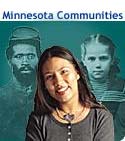|

Teachers
overview
primary sources
contact us
Gallery
advertisements
art
books
data
diagrams
diaries
documents
letters
maps
newpapers
objects
photographs
About
philosophy
bibliography
credits
|
 |
Title: Points on Municipal Suffrage
Type: Document
Date: no date
Source: Goodhue County Historical Society
Description: Nelson wrote and distributed this document describing her arguments for municipal suffrage for women.

Transcription:
POINTS ON MUNICIPAL SUFFRAGE
The right to vote in the elections of a municipality, or city.
BY JULIA B. NELSON
- Women are voters. They were made such by an amendment to the State Constitution and subsequent legislation.
- No other or greater qualifications are necessary to vote for city officers than for school officers.
- The question of military service does not enter into municipal suffrage. It is not customary to declare war about the location and cost of buildings, bridges and other public improvements.
- Since the privileges of women voters may be wholly taken away by the Legislature in granting a city charter which gives the appointment of school boards to city officers elected by the votes of men only, it would seem that municipal suffrage for women properly comes under the control of the Legislature.
- Kansas gave municipal suffrage to women by an act of the legislature and the act has been declared to be constitutional by the courts. Municipal suffrage bills have been introduced in the legislatures of Illinois and Nebraska and the signs of the times indicate that favorable action will be taken.
- There is nothing in the Constitution of the United States which prohibits women from voting. In New Jersey they voted for President for twenty-five years, and those who feared a constitutional lion in the way of Wyoming's admission to the Union as a woman suffrage state found that it was a stone lion and would not bite.
- When the male citizens of New Jersey chose to put the word male in their State Constitution they did so, for the property qualification
Requirement that only those owning property could vote.
for voters and the little chance for women to acquire property in the few pursuits that were open to them at the low wages paid to them, left few women to vote or to protest against the abridgement
Shortening.
of their privileges.
- Since women are treated as male citizens in the municipal courts it is consistent that theyshould be considered as male citizens in the municipal elections.
- Woman's influence, like charity, begins at home but should not end there.
- In these days of crowded electric cars, the objection of both sexes meeting at the polls is out of date.
- Granting municipal suffrage to women abridges the privilege of no man and compels nobody to exercise the right of suffrage.
- If women will not vote nobody is injured by their having the privilege; if they will vote or if any woman anywhere will vote and is not permitted to do so, there is an injustice which should be remedied.
- If a dozen women take no interest in public affairs and one women is patriotic and philanthropic,
Interested in humanitarian causes.
she should not be disfranchised
Denied the right to vote.
on account of the indifference
Lack of interest.
of other women.
- The fathers of this Republic started out with the declaration that "all men are created equal"; that they are endowed by their Creator with certain inalienable rights, etc. Did they mean all "males"? In what are all men equal? They differ in stature, strength, mental power, figure, feature, color, wealth, condition, etc. There is but one thing in which all men and all women are equal, and that is equality of natural rights, equality of privileges, equality of opportunity. The ballot is the sign and seal and guaranty of equality of rights. If women have any rights at all, they ought to have the guaranty
Assurance.
of the ballot with which to defend their property rights, their education, their industrial and their home interests. That those who must obey the law should have no voice in the choice of rulers is un-American. It is opposed to the principles for which Jefferson spoke and Washington fought. The "no-place-for-morality-in-politics" statesman
A highly regarded political leader.
has had his day and soon the places which once knew him will know him no more forever.
|
|


